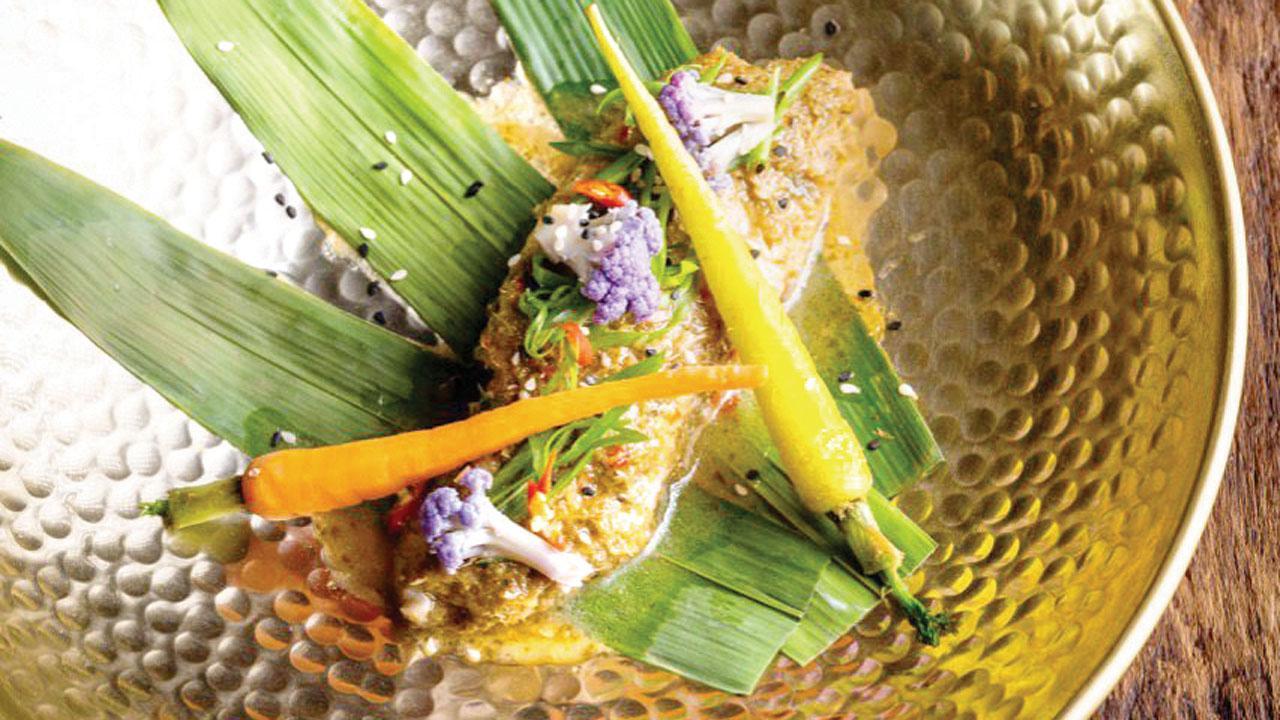Cooking in leaves may sound hip now, but it’s been a part of Indian cuisine for centuries. Two chefs share recipes close to their heart

Asian spice bamboo leaf-steamed sea bass
Across India, steaming food in leaves is a small but integral part of many regional cuisines. Think panki and alu wadi in Gujarat and Maharashtra, ela ada from Kerala, paneer bhapa from Bengal, and bangwi from Tripura. This age-old, eco-friendly method not only elevates a dish by sealing in the flavours and keeping it healthy, but also imparts a natural, organic earthy flavour and aroma. Author and chef Swayampurna Mishra says, “Most food steamed in leaves requires little or no fat, and yet it remains extremely moist. It’s a win-win. Besides, steaming preserves 50 per cent more nutrients than heat-induced cooking methods. I love steaming chicken breasts in an oven rack immersed in a larger pot of water. The resultant chicken is glistening, moist and tender.”
ADVERTISEMENT
Enduri pitha
Three steps to make enduri pitha. Pics Courtesy/Glorious Konkan and Instagram
The enduri pitha or haldi patara pitha is a regional specialty of Odisha that finds its variants as patholi in Konkan, Goa and coastal Karnataka. It’s healthy, with the added bonus of being a multi-sensory experience.This dish is flavoured with memories of chef Mishra’s childhood and is often made during Prathamastami and Manabasa Gurubara. “Haldi or turmeric leaves are loaded with antioxidants thanks to curcumin; they help in boosting digestion and have anti-inflammatory properties. They are slightly bitter but the astringent notes of turmeric coupled with its singular aroma make cooking with the leaves a delight for the senses,” she adds.
Ingredients
For the batter:
>> 2 cups uncooked rice (short-grained)
>> 1 cup black gram
>> Water
>> Salt
For the filling:
>> 1 whole coconut (freshly grated)
>> 1/2 cup cottage cheese
>> 1/2 cup jaggery
>> 4 pounded green cardamoms
>> 1 tbsp ghee
>> A few raisins
>> A bunch of turmeric leaves
Swayampurna Mishra
Method
Soak rice and gram for four to five hours; grind them until completely smooth. Beat together and leave to ferment overnight. For the filling, sauté everything in a little ghee till the mixture is dry, smells deeply of coconut and the colour turns amber. Take off the flame, add raisins and let it cool. Wash and pat the turmeric leaves dry, ladle a portion of the batter on one side (lengthwise) of the leaf. Add a good serving of the filling on it. Now, gently fold the other side of the leaf over the filling. Make sure the filling isn’t pushed to the edges. Steam in a steamer for eight minutes. Remove, allow it to cool and serve with kheer.
Asian spice bamboo leaf-steamed sea bass
Chef Rohan D’souza, culinary head, Silver Beach Hospitality, never misses an opportunity to steam food — especially fish — in bamboo, banana or pandan leaves. “It’s an art,” he says. He finds the leaf-wrapped method very compact as it keeps the flavours intact and gives the dish a herbal composition while protecting the food from direct heat and fluids. “Bamboo leaves contain methanol which is very good for the skin. Because it is rich in cellulose, it helps in digestion. But overall, the earthy flavour that the leaves impart to the fish is what makes the dish a hit,” he adds.
Rohan D’souza
Ingredients
For the Asian spice paste:
>> 1-1/2-inch fresh turmeric
>> 2 tender lemongrass stocks
>> 5 pods garlic
>> 1/4 tsp palm sugar
>> 5 shallots
>> 2 to 3 dry chillies
>> 3 to 4 Thai bird’s eye chilli
>> 1 kaffir lime leaf (torn)
>> 1/2 tsp salt
>> 1 pod tamarind pulp
>> 2 to 3 Thai holy basil leaves
For the fish:
>> 220 gm bhetki (cut into chunks)
>> 8 to 9 bamboo leaves (soaked overnight)
>> 1 to 2 ladles seafood stock
Method
Grind the spices into a coarse paste, preferably in a stone mortar and pestle. Apply it to the fish and leave it to marinate for 45 minutes. Spread out two bamboo leaves and place the fish in the centre. Roll it over into a parcel shape, and conceal it with toothpicks or kitchen thread. Line a deep baking dish with parchment paper and place the fish parcels along with a couple of ladles of fish stock. Cook in an oven at 165 degree Celsius for nine to 11 minutes. To serve, place the fish parcels along with the juice, and top it with sliced spring onions, coriander sprigs, some steamed and buttered cauliflower and carrots, and sliced chilli for extra heat. It makes for a great accompaniment with jasmine rice.
How to steam right
>>Do not cook for too long. Steaming vegetables takes a maximum of seven minutes or they lose their vibrancy. For fish or white meat, 10 to 12 minutes is enough.
>>Pack the marinade or masala that goes in the leaves with tons of flavour for a heady aroma to fill your senses when you open the leaves.
>>Steaming needs very little water. The water shouldn’t touch the food.
>>For steaming fish, the preferred choice is white fish.
>>Ensure the fish is properly concealed; else, the juices will escape and dry out the fish.
Also Read: Fit for a nawab
 Subscribe today by clicking the link and stay updated with the latest news!" Click here!
Subscribe today by clicking the link and stay updated with the latest news!" Click here!






